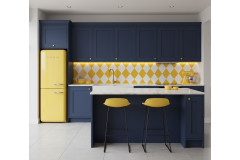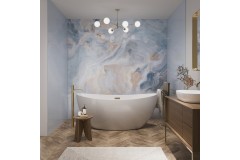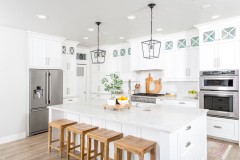
Wooden Worktop Species UK
In the UK there are quite a few wood species that are used as work surfaces in the kitchen, the first obvious decision to make is what colour or tone you are looking for. This unfortunately would be most customers only consideration, but do not let this be the only deciding factor.
In a kitchen environment there are variables such as moisture, condensation and heat which can all affect the performance and longevity of the timber as it is a natural product that reacts to its surrounding conditions.
What are some of the most important things to consider and look for when choosing a wood species?
- Is the area it will be installed in going to be heavily used and busy?
- Will it come into contact with water very often?
- What sink will be installed (overmounted, undermounted or Belfast)?
- Am I willing to do periodic maintenance of the wood surface?
- Is the timber FSC approved?
- Always make sure of the wood grade.
- Are the worktops finger jointed? (Sign of good quality)
- What affect am I trying create? (choosing between natural or prime timber worktops)
- Is this going to be a long term investment or does it not have to last too long (go for cheaper wood species or a good hardwood species)
Should I Consider a Hardwood or Soft Wood?
Light coloured woods are generally considered to be soft woods, this would be timbers such as Maple, Rubberwood, and Ash and a couple more unknown species. They are generally from the northern hemisphere in colder and high altitude conditions, these woods are not as durable as hardwoods due to it not having a very high impact resistance, but have other attributes as being easier to work with, lighter and some species having a high resistance to rotting.
Hardwoods are generally from the southern hemisphere in sub-tropical conditions and are darker in tone, these timbers would include African, American and European Walnut, Iroko, Wenge and Teak to name a few These woods generally are heavy and hard which make them very durable and have a higher resistance to heat, impact and scratching. Also due to its generally tight grained structure and high natural oil content it resists moisture well which is always a good attribute to have in wet areas. Hardwoods are generally harder to work with but most modern day carpentry tools overcome this quite easily.
Then there are the trusted favourites in the form of Oak, Beech and Cherry, these timbers are in between hard and soft woods in terms of hardness and colour, but has the best of both with none of the draw backs, these should be a top contender beside hardwoods when considering a wood species.
How can I make an environmentally friendly choice when deciding on a wood species?
The first step is to make sure that the timber is FSC (Forest Stewardship Council) approved this is an organisation that makes sure timber is responsibly sourced harvested and milled. For more info on FSC visit www.fsc-uk.org, It is important to remember that FSC timber is generally more expensive due to the procedures put into place to make the sourcing, harvesting and milling of timber more sustainable, but it is the best choice because you know that the companies that comply with FCS principles are also the companies that are highly invested in this industry and they will supply the best timber possible and in turn create wooden worktops of the highest quality and standards.
Also consider Bamboo worktops as Bamboo is one of the world’s most sustainable natural materials due to its fast growth rate. It is also extremely resistant to moisture and bacteria so it is worth having a look into especially if you are considering a lighter coloured wooden worktop.












Leave a Reply Cancel Reply
All fields are required